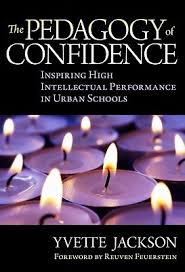“…I find so important that these structures of the NUA program give everybody a framework of a voice. And that everybody’s voice is valid…”
—Jeni Overbey, 3rd Grade Teacher, Clifford School
The Redwood City School District (RCSD) is in its third year of a collaboration with the National Urban Alliance (NUA). Through the pandemic, administrators, teachers, NUA Mentors and students have persevered and worked toward deeper implementation of The Pedagogy of Confidence and the High Operational Practices developed by Dr. Yvette Jackson.
On this post:
- Overview
- Pedagogy of Confidence Guidance Protocol
- The Partnership Model
- What is National Urban Alliance?
- What is the Pedagogy of Confidence?
- Outcomes
 An example of the commitment toward equity consciousness education for all learners was evident in a recent two-day Professional Learning Cycle in December 2021 with site administrators. On the first day, NUA personnel conducted classroom walkthroughs with site administrators to pilot the newly developed Pedagogy of Confidence Protocol, a tool to measure level of implementation of the 7 High Operational Practices. On day two of the Professional Learning Cycle, RCSD administrators from across the district came together to further develop their understanding of the High Operational Practices by conducting a virtual “district walk through” of RCSD classrooms, again using the Pedagogy of Confidence Protocol.
An example of the commitment toward equity consciousness education for all learners was evident in a recent two-day Professional Learning Cycle in December 2021 with site administrators. On the first day, NUA personnel conducted classroom walkthroughs with site administrators to pilot the newly developed Pedagogy of Confidence Protocol, a tool to measure level of implementation of the 7 High Operational Practices. On day two of the Professional Learning Cycle, RCSD administrators from across the district came together to further develop their understanding of the High Operational Practices by conducting a virtual “district walk through” of RCSD classrooms, again using the Pedagogy of Confidence Protocol.
The video below on the left shares teacher reflections and students in classrooms with The Pedagogy of Confidence High Operational Practices in action (December 2021), and the video on the right is from a recent Leadership Training (January 2022) facilitated by Yvette Jackson, Maria Sudduth and Linda Montes with leaders from all Redwood City Schools. The Leadership Session included use of the observations in action (with the video) while visioning forward using the Pedagogy of Confidence Protocol.
“…in this framework comfortable, confident and has the structure to be able to do so… scaffold in different levels… in the NUA program lays down a sense of confidence everybody’s thought is valued… amazing”
—Jeni Overbey, 3rd Grade Teacher, Clifford School
see the video below, left
Pedagogy of Confidence Protocol
The Pedagogy of Confidence® (PoC®) Protocol provides district and school partners with the tool to monitor progress from the beginning level of PoC implementation (Innovation), to developing PoC practices (Building) toward deeper and sustainable implementation (Sustainability). The PoC Protocol explicates the 7 High Operational Practices with indicators leading toward sustainable practices. The seven overviews of each of the High Operational Practices are listed below, which are fully framed in the Pedagogy of Confidence Guidance Document with a format for understanding with implementation and that is actionable.
| Essential Criteria | Innovation | Building | Sustainability |
See the complete Pedagogy of Confidence Guidance Document (PDF)
 IDENTIFYING AND ACTIVATING STUDENT STRENGTHS. Teaching that encourages students to recognize and apply their strengths releases neurotransmitters of pleasure, motivating students to actively participate and invest in a learning experience, set goals for their learning, and follow through with their learning for meaningful application and deeper development of strengths for personal agency.
IDENTIFYING AND ACTIVATING STUDENT STRENGTHS. Teaching that encourages students to recognize and apply their strengths releases neurotransmitters of pleasure, motivating students to actively participate and invest in a learning experience, set goals for their learning, and follow through with their learning for meaningful application and deeper development of strengths for personal agency. - BUILDING RELATIONSHIPS. Students fare best cognitively, socially and emotionally when they know they are liked, appreciated, valued as part of a vibrant, caring community. Positive relationships stimulate oxytocin, positively impacting both the motivation and the memory capacity critical for learning.
- ELICITING HIGH INTELLECTUAL PERFORMANCE. Students crave challenges. Their intelligence flourishes when they are asked to think at high levels about complex issues, demonstrate what they know in creative ways, and develop useful habits of mind such as reflection, raising substantive questions for deeper understanding and thinking flexibly and innovatively.
- PROVIDING ENRICHMENT. Enrichment taps students’ interests, generates strengths, expands their cognitive capacity, and guides them to apply what they know in novel situations for self-actualization.
- INTEGRATING PREREQUISITES FOR ACADEMIC LEARNING. Foundation schema building activities are critical so that students have the right foundations for learning new information and acquiring new skills. This foundation heightens students’ understanding, competence, confidence, and motivation.
- SITUATING LEARNING IN THE LIVES OF STUDENTS. Students perform most effectively when they can connect new learnings to what is relevant and meaningful to them. These connections validate their lived experiences activating the focusing of the brain through its Reticular Activating System (RAS). Without such personal connections, the new learnings are not likely to be retained and used effectively.
- AMPLIFYING STUDENT VOICE. Encouraging students to voice their interests, perspectives, reflections, opinions and enabling them to make personal contributions is not only motivating but also builds the confidence, agency, academic language, investment, and skill students need to join wider communities of learners and doers in the world outside of school. Students know their voices are heard as they have influence in their own learning process.
Download the complete Pedagogy of Confidence Guidance Document (PDF)
Amplifying Student Voice
Self Direction — Self Actualization
“…the level of student engagement… for distance learning and when we move back into the traditional classroom settings…
using the Pedagogical Flow Map with priming and processing… take it up a notch…
…the district has done an amazing job…“
The Partnership Model
National Urban Alliance (NUA) and Redwood City School District collaboration is now in it’s third year. The Professional Learning Cycles with NUA has included multiple elementary and middle schools, district coaches, leadership trainings, school board trainings, facilitating the Equity Committee with community participation that has evolved into equity policy and amplifying student voice.
What is National Urban Alliance?
www.nuatc.org National Urban Alliance, NUA, was founded in 1989 at Columbia University focusing on equity consciousness through professional development of whole schools and whole districts. NUA’s hands on approach of the Pedagogy of Confidence framework by Yvette Jackson with High Operational Practices models its’ commitment to equity consciousness through pedagogy that amplifies student voice for self direction and self actualization. In Redwood City the collaboration has included NUA Scholars modeling lessons with students in classrooms (in-person and virtual), district trainings of educators, on-site support of educators, leaders trainings, school board trainings, amplifying student voice and more.
National Urban Alliance, NUA, was founded in 1989 at Columbia University focusing on equity consciousness through professional development of whole schools and whole districts. NUA’s hands on approach of the Pedagogy of Confidence framework by Yvette Jackson with High Operational Practices models its’ commitment to equity consciousness through pedagogy that amplifies student voice for self direction and self actualization. In Redwood City the collaboration has included NUA Scholars modeling lessons with students in classrooms (in-person and virtual), district trainings of educators, on-site support of educators, leaders trainings, school board trainings, amplifying student voice and more.
What is The Pedagogy of Confidence?
www.pedagogyofconfidence.net The Pedagogy of Confidence is an approach to learning and teaching that is based on the fearless expectation that all students are capable of high intellectual performances when provided High Operational Practices™ that motivate self-directed learning and self-actualization.
The Pedagogy of Confidence is an approach to learning and teaching that is based on the fearless expectation that all students are capable of high intellectual performances when provided High Operational Practices™ that motivate self-directed learning and self-actualization.
These seven High Operational Practices are the fulcrum around which the “gifted” education of the Pedagogy of Confidence revolves, gearing the objectives for each practice to facilitate students exploring and acting on their potential to produce the high intellectual performances that can motivate self-directed learning, self-actualization, and self-transcendence. The inherent strategies and actions used to identify and build on strengths, provide enrichment and create schema that connects to a student’s cultural frame of reference inherent in “gifted education” serve to enhance comprehension that results in strengthened competence, confidence, resilience and high intellectual performances (Jackson, 2017).


